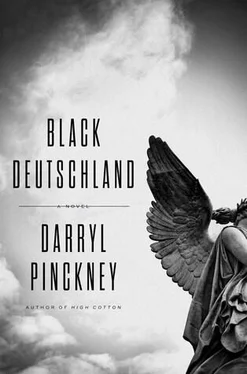Women’s scents dominated my hut. Women’s voices answered the phones, their German, French, and English requests and explanations a counter hum to the generator outside, directly behind me. I sat in the rear, facing the well toward the door. I had a wobbly white plastic desk and an overly designed chair with a thin seat. The press girl who was too busy for chitchat had a larger, steady desk to my left. I had to stand if I wanted to look out the dormer window on my right. Once, I saw an assistant in high-heeled black boots stagger over the gravel to clutch after a page of vellum sweeping away from her. Across from the window, two fax machines spat unpredictably, and when they did I thought of a particularly crazy person talking to himself in fits and starts in front of the once-proud Ida B. Wells Homes back in Chicago. Mostly, I read, hiding, I thought, how inadequate my German was for the job, though presumably it was not why I was there.
I hadn’t made friends at the workshop. Young Germans spoke English because of rock music, movies, and educational policies in the American and British sectors. But they returned my wave at five o’clock as though they were too exhausted for any more translation. I was the only one to quit at that hour and I did not come in on weekends, when the real life of the workshop got going. I’d come in on Monday and hear what had been decided, or finished, or that Rosen-Montag had drawn for six hours straight. The only music permitted conformed to his tastes, things that his arm could move well to.
I was missing out on evening action at the workshop because I was getting home in time for dinner with Cello and her family. I was missing out because I was going to the AA meeting on Saturdays down in Dahlem, stepping onto the bright orange underground train with a ticket, my days of daring to ride without a ticket over. A couple of black noncommissioned officers from the meeting invited me to play pool, but I was in an agony sitting there, looking stupid in their married quarters rec room, not knowing how to play, and they got tired of remembering to include me in the conversation. When they learned that I didn’t work for any U.S. outfit, they didn’t know what to say to me. They did not understand my job. I didn’t much either.
Rosen-Montag shook my hand when he at last returned to Berlin, but I had yet to have a one-on-one or a walking meeting with him, which he said our work would grow from. Each month I gave his wife a bundle of texts, the higher blather about themes I knew Rosen-Montag to be interested in, and she would report back in a week or so that I was to keep going, that my attack on the assumption that government-subsidized housing projects were permanent features of the urban landscape was exactly what he wanted to say. She handed me a slip, which I handed to a girl with hair so henna-rinsed it was magenta, and the girl had me sign a register, and then she slid across her sturdy metal table a white envelope with my name on it, an envelope swelling with fresh West German marks. Jed Goodfinch. Adult life was working out.
I had lunch alone, walking through the cold drizzle to a small Greek restaurant presided over by a hairy waiter, in the vicinity of the Anhalter station’s memorial fragment and the Gropius Building, a lovely Renaissance-style palace designed in the nineteenth century by the Bauhaus founder’s uncle. Or was he his great-uncle? It had been derelict since the war, its mosaic and tile decoration long since stolen, pried off the walls and on sale from antique dealers around the continent. Once a museum, recently restored, the Gropius Building was much admired, though it had no purpose anymore, like many prewar public spaces in Berlin. It was fun to trespass, to roam its staircases and darkened rooms. The sound my heels made jazzed me and brought out guards or assistant curators reluctant to correct a black American with International Building Exhibition identification. A mere street of cobblestones separated the Gropius Building from the Berlin Wall that followed its right angles.
Sometimes I brought intriguing volumes about urban design to the canteen hut, but I still finished my sausage sitting by myself. I hadn’t made my pilgrimage to the Schinkel Pavilion on the edge of the grounds of the Charlottenburg Palace since I’d been back in Berlin. I used to visit the idealized little house on the palace grounds in order to brood in front of a gloomy Caspar David Friedrich landscape. But my soulful moments at this shrine had been as made up as the Gothic ruin in the white mist he laid on so thickly.
There was no reason for anyone to go to the part of town the workshop was in, unless it was to attend a big party in one of the empty buildings the city couldn’t think of what to do with. After autumn expired and it was too cold for soulful walks that didn’t wake up my soul, I began to spend a fortune on taxis and turned in the receipts. I did not have new friends or the new feelings I wanted to have in Berlin, but I was doing what black expatriates in Europe had a harder time doing than getting people to go to lunch with them: I was earning a living.
* * *
“Could Schubert do anything besides modulate?” Cello moaned. “And then he puts in a repeat. Just goes on and on. It’s kind of hard to take. The Trout Quintet . It’s the most overplayed chamber piece on the planet. It’s a great piece, but that doesn’t mean it’s not overplayed.”
She grabbed her head at the thought of the concert she’d just endured. She leaned against the cabinet, her way of not having to sit down with me while doing enough to get debriefed on what I was up to. She said she was impressed by my sobriety, my seriousness. She said she’d been sure I would look up the drunks and disco trash that I used to hang with. English signaled that Cello, my fellow African American, was in an off-the-record mood with me. She congratulated me on the first anniversary of my sobriety. I didn’t care. I wasn’t thinking about white wine anymore.
Usually my conservations with Cello were brief because they were in German. She and Dram took me at my word that I wanted them to correct my grammar. I wished they hadn’t taken me at my word when I offered a token room and board. But Cello was in favor of my adult life; Mom said Dad was relieved I could pay my way. They fed me dinner and Cello’s resentful Russian maid gave my bathroom the most cursory cleaning, but still they made her do it. I stayed caught up with the phone bill as well.
Cello unplugged her phones during the day, anyway, when she was deep into something like one of the Liszt Transcendental Études , which, were she to be honest with herself, she said, was slightly beyond her in the first place. If she really couldn’t concentrate, or if a passage was really upsetting her, she’d throw on a coat and rush off with her satchel to Dahlem, where she kept the practice room Dram had got for her years before.
I had to use the phone in her study, when it was plugged in. It was the nearest to my maid’s room. When the call was for me, she had a way of knocking on my door, escorting me back into her study, handing me the receiver, and then withdrawing — far off to the kitchen — or retreating, closing the doors of her inner room with the Bösendorfer. The call was seldom for me. Mom did not like to have to make conversation with Cello. Dram did not believe in separate phone lines for husband and wife.
Cello was telling me that the hideous-looking church at Europa Center actually had pretty good programs of Bach cantatas. Then the phone rang. It was well after ten o’clock. Dram had gone to their bedroom as soon as they’d returned from the concert. The new nanny, from somewhere in Kent, had turned the heat up unacceptably. Cello told me in German that the call was for me. She was on her way out the door, but I motioned her back. She moved when she heard me address Rosen-Montag. My German fell apart as we negotiated in simple sentences where we were going to meet.
Читать дальше












